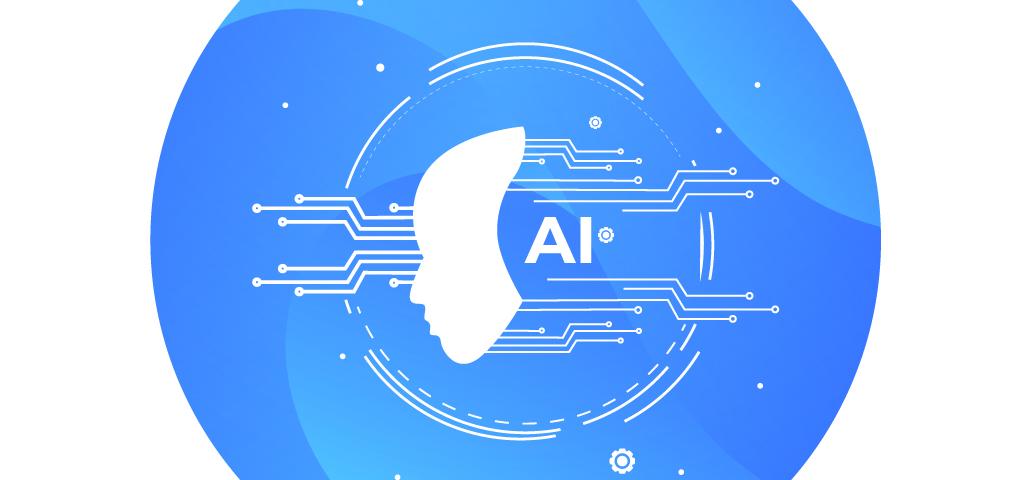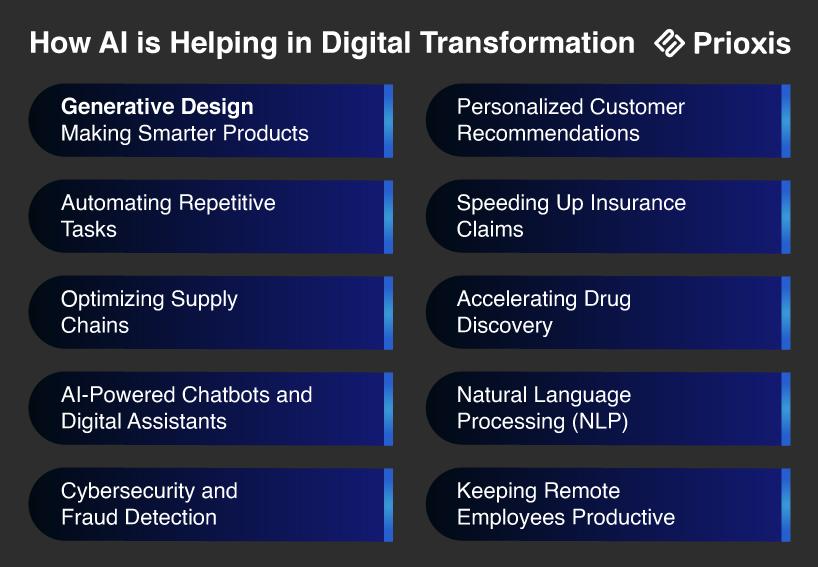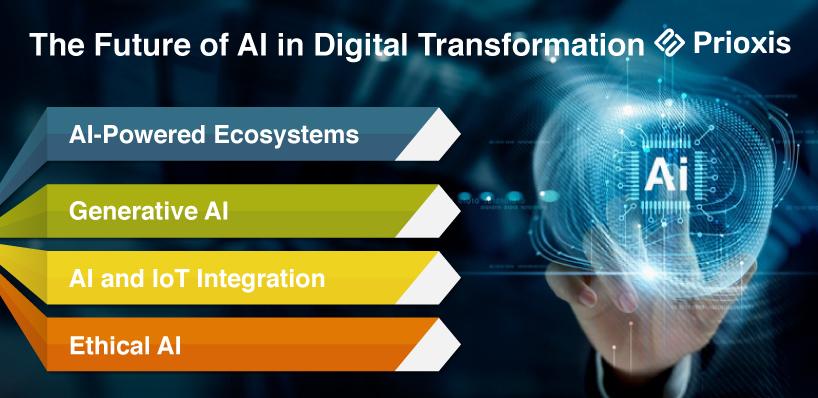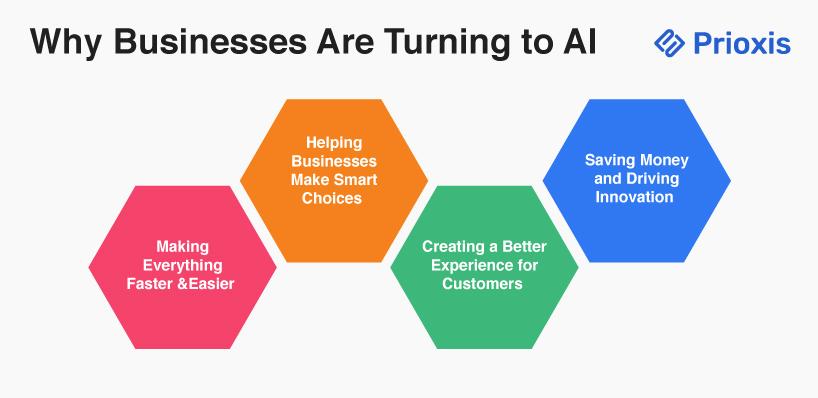The Role of AI in Digital Transformation in 2026
 Admin
Admin Digital Transformation
Digital Transformation Oct 21, 2024
Oct 21, 2024

Table of Content
Imagine a business trying to stay competitive in today’s world. It's like a runner in a race. Every day, the racecourse changes, new hurdles appear, and the competition gets tougher. To keep up, businesses need to be smarter, faster, and more adaptable. That’s where Artificial Intelligence (AI) comes in. AI solutions is like a tool that helps businesses work better, make quicker decisions, and create personalized experiences for their customers. And this is all part of what’s called digital transformation.
But what does “digital transformation” mean? In simple terms, it’s when businesses use technology to improve every aspect of how they work. It’s not about having a website or using computers—this is about changing the entire way a company operates. AI plays a huge part in this because it can do things that would take humans way longer to complete. It helps companies keep up with changes, save time, and deliver better products and services to their customers.
In this guide, we’ll break down how AI and Digitalization is making a big difference in businesses today and how companies like Netflix, Amazon, and others use it to stay ahead.
What is AI Digital Transformation?
Before we dive deeper, let’s talk about what Artificial Intelligence (AI) is. AI is a technology that enables machine to think and learn like humans. They can solve problems and understand human language. They can also make decisions based on data. For example, when you watch Netflix, AI is the technology that suggests other shows or movies based on what you’ve watched before. Or, when you shop on Amazon, AI helps recommend products you might like based on your browsing history.
Now, let’s move on to digital transformation. Think of it as a massive upgrade to how businesses run. It means using smart technology like AI to change the way they operate from top to bottom. AI Digital Transformation solutions helps your business speed up processes, understand customers better, and improve decision-making.
Why Businesses Are Turning to AI?
Making Everything Faster and Easier
Imagine a small retail store that’s growing rapidly. In the beginning, the store manager can handle customer orders, inventory tracking, and customer service on their own. But as the business grows, these tasks become overwhelming. This is where AI and Digital Transformation comes in.
AI automates repetitive tasks like answering basic customer inquiries, managing inventory, or processing transactions. With AI handling these tasks, employees can focus on more strategic or creative work.
For instance, AI-powered chatbots can answer common customer questions around the clock. So, your customer service agents can focus on more complex inquiries.
Helping Businesses Make Smart Choices
Companies collect a ton of data every day, but making sense of all that information can be overwhelming. AI can quickly analyze data and help businesses make decisions based on trends and patterns that would take humans way longer to figure out.
For example, AI can help a store decide what products to stock more of or predict which items will sell best next month.
Creating a Better Experience for Customers
We’ve all seen how AI personalizes things. For example, Netflix suggests shows and movies based on what you’ve watched, and Amazon recommends products you might like based on what you’ve bought before. This way, you can keep customers happy by showing them exactly what they want.
Saving Money and Driving Innovation
AI and Digital Transformation helps businesses save money by automating tasks that used to need manual effort. For example, in manufacturing, AI can automate production processes, track equipment for maintenance needs, and optimize supply chains. This reduces costs associated with labor, downtime, and errors.
Besides saving money, AI and Digitalization drives innovation. Companies can use AI to test new ideas and develop products faster. For example, generative design tools powered by AI can generate thousands of design options for a product based on specific criteria.
AI for Digital Transformation
1. Generative Design: Making Smarter Products
In industries like manufacturing and product design, generative design powered by AI is a game-changer. It works like this: you give the AI a set of guidelines—like size, weight, or material—and the AI generates thousands of design options. Engineers or designers can then pick the best ones to test and refine.
For example, A company that makes airplanes, used AI to redesign a partition in their A320 aircraft. The result? The part became 45% lighter, which saved fuel and made the airplane more efficient. That’s the kind of innovation AI can bring to the table.
2. Personalized Customer Recommendations
One of the coolest things AI and Digitalization does is help businesses offer personalized experiences to their customers. Amazon and Netflix are prime examples of this. Amazon uses AI to recommend products based on what you’ve browsed or bought before, and Netflix does the same with movies and TV shows.
When you open Netflix and see a list of recommended shows, that’s AI working behind the scenes. It’s studying your past choices and suggesting things you might enjoy. This keeps users engaged and happy, which is exactly what businesses want.
3. Automating the Repetitive Stuff
Let’s face it—some tasks are repetitive. Filling out forms, answering the same customer questions over and over, or sorting through data are time-consuming. Robotic Process Automation (RPA) uses AI to handle these repetitive tasks. It’s like having a robot that takes care of the mundane stuff, so employees can focus on more meaningful work.
For example, a bank in the UK used AI to automate their client onboarding process. Before AI, employees had to manually go through piles of paperwork, but now AI does most of the work, saving tons of time.
4. Speeding Up Insurance Claims
The insurance world can face challenges in claim processing, but AI and Digitalization is helping to change that. AI can quickly process claims and even detect fraud, making the whole system more efficient. Take Lemonade, for example. They use AI to process around 30% of their insurance claims instantly, without any human involvement. This helps customers get their money faster and reduces the company’s workload.
5. Improving Supply Chains
Managing a supply chain—getting products from the factory to the customer—can be tricky. AI helps businesses predict demand, manage inventory, and optimize shipping routes to save time and money.
According to McKinsey, companies using AI to optimize their supply chains have seen a 15% reduction in logistics costs and a 35% cut in inventory costs. That’s a huge win for businesses that rely on efficient shipping to keep customers happy.
6. Accelerating Drug Discovery
In the medical world, finding new drugs is usually a long, drawn-out process. But AI is speeding things up.
Exscientia, for example, uses AI to help discover new drugs much faster than traditional methods. In fact, they’ve been able to cut the drug discovery process down from five years to just eight months.
This is especially important when dealing with diseases like COVID-19, where time is critical.
7. AI-Powered Chatbots and Digital Assistants
AI-powered chatbots are becoming more common in customer service, and they’re getting smarter all the time. These bots can answer customer questions, help with basic tasks, and even schedule appointments. Google Duplex is a great example. It can call a restaurant or salon and make a booking for you, sounding just like a human.
Businesses love chatbots because they help reduce the number of calls that human agents need to handle, saving time and money.
8. Natural Language Processing (NLP)
Natural Language Processing (NLP) enables machines to understand and respond to human language. It’s what powers tools like voice assistants (think Siri or Alexa) and automatic translations. NLP is also used to analyze customer reviews, helping companies understand how customers feel about their products or services.
For instance, Expedia uses NLP to scan through online reviews and find out what customers like or dislike. If there’s a lot of negative feedback, they can change their strategy or fix any problems before things get worse.
9. Cybersecurity and Fraud Detection
With so much business happening online, companies are always at risk of being hacked or falling victim to fraud. AI helps protect businesses by spotting unusual activity—like someone trying to log into a system from a suspicious location—and blocking it before it causes damage.
HotelTonight, for example, uses AI to prevent fraud and has reduced fraud-related losses by 50%. AI is a huge asset in keeping businesses and customers safe.
10. Keeping Remote Employees Productive
With more people working from home these days, companies are using AI for Digital Transformation to help track employee productivity. AI tools can track what employees are working on, how long tasks are taking, and make sure company data stays safe.
AI also helps spot any unusual behavior that could be a security risk, like an employee trying to access sensitive files they shouldn’t be looking at.

The Future of AI for Digital Transformation
1. AI-Powered Ecosystems
In the coming years, many businesses will adopt AI-powered ecosystems. These are like interconnected systems where AI is integrated into every part of a company.
For example, let’s say a product sells out suddenly. An AI system could immediately reorder stock, send updates to the warehouse, and even notify customers when more inventory is available. This type of seamless, real-time communication makes businesses more responsive and efficient, helping them adapt quickly to changes.
2. Generative AI
Generative AI is a kind of AI that doesn’t analyze data but creates new things—like text, images, or even videos. In industries like marketing and design, generative AI will be a game-changer. Imagine being able to create social media posts, product descriptions, or even a video campaign in a fraction of the time it usually takes.
For businesses, this means content creation can be faster, cheaper, and still highly creative. Generative AI allows teams to focus on big ideas while letting AI handle the smaller tasks. It’s like having a creative assistant that never runs out of steam, helping companies push out content quicker and keep up with the demand for fresh material.
3. AI and IoT Integration
You’ve heard of smart devices—things like smartwatches, smart refrigerators, or even smart security systems. These devices are part of what’s known as the Internet of Things (IoT), which means they’re all connected and can share data over the internet. When businesses combine AI and Digital Transformation with IoT, they get real-time insights that help them make smarter decisions.
For example, a retailer might use IoT devices to track inventory in real-time, while AI analyzes this data to predict when items are running low and automatically reorder them. Or think about a delivery company using AI to track its trucks, ensuring they’re taking the best routes and avoiding breakdowns. By combining AI with IoT, businesses can be more efficient and stay ahead of any potential issues.
4. Ethical AI
As AI becomes more powerful, businesses need to be sure they’re using it responsibly. Ethical AI means using AI systems that are fair, unbiased, and transparent. This means making sure AI isn’t making decisions based on faulty or biased data.
For example, if a bank uses AI to approve loans, it’s crucial that the system doesn’t favor one group over another. Using AI ethically helps companies build trust with their customers and ensures that the technology they use is fair for everyone. It’s about being responsible with the tools we have and making sure AI benefits all.
Further Read: DAM Best Practices

Real-World Examples of AI for Digital Transformation
1. Amazon
When you’re shopping on Amazon and see suggestions for products you might like, that’s AI working in the background, analyzing what you’ve searched for and purchased before. But it doesn't stop there—Amazon Also uses AI to provide product summaries that help customers make better buying decisions. So, if you’re shopping for a TV, AI gathers and presents all the essential information you need, from product features to customer reviews, helping you compare top brands and models quickly. This smart use of AI makes the buying process faster and more informative.
In addition to enhancing the shopping experience, Amazon leverages AI in its delivery operations. AI systems help delivery partners figure out which products to deliver in specific areas,
2. Netflix
Ever wonder how Netflix knows exactly which show or movie you’ll want to watch next? That’s AI at work. Netflix uses AI to recommend content based on what you’ve watched before, making the whole experience feel personalized. This is why you often find yourself binge-watching show after show—the recommendations are tailored to your taste, keeping you engaged and coming back for more. Netflix’s use of AI is a big part of why they continue to stand out in the crowded streaming market.
3. General Electric (GE)
GE uses AI to monitor machines in real-time, like equipment in factories or even engines in airplanes. Their AI systems predict when something might break down so they can fix it before it becomes a bigger problem. By spotting issues early, GE reduces downtime and keeps operations running smoothly. It’s a bit like having a mechanic that can see the future—AI helps them know when to repair something before it fails.
4. Healthcare
AI and Digital Transformation is changing the healthcare industry too. Doctors are using AI to diagnose diseases faster and provide more accurate treatments. For example, AI can scan medical images—like X-rays or MRIs—much faster than a human could, and it can spot problems that might be easy to miss. This helps doctors make better decisions and provide more personalized care. AI is also helping to create treatment plans that are tailored to each patient, improving outcomes and speeding up the process of getting the right treatment.
Wrapping Up: AI for Digital Transformation
AI is already changing the way businesses operate, and it’s only going to become more important in the future. As AI becomes a bigger part of business, companies that embrace it will have an edge over those that don’t.
In short, AI is here to stay, and it’s going to shape the future of business in ways we’re just starting to see. It’s exciting, it’s transformative, and it’s opening a world of new possibilities for businesses everywhere.
At Prioxis, we understand the power of AI in transforming businesses. Whether it’s saving time, cutting costs, or helping you stay ahead of the competition, we’re here to help you. Let’s work together to make your business smarter, more efficient, and prepared for the future.
Get in touch

